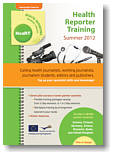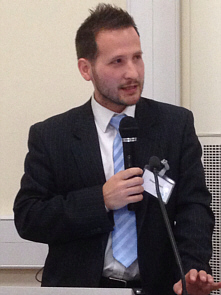 |
||
|
|
||
 Free coursesThe Royal Statistical Society Science Journalism Training Programme has just launched two free online courses for journalists on science and statistics – access here HeaRT project:EU-funded training and development for Health Reporters Contact HeaRT partners
Links to relevant organisationsAHCJAssociation of Health Care Journalists Behind the Headlines "Guide to the science that makes the news" Guild of Health Writers www.healthwriters.com HealthNewsReview (US) www.healthnewsreview.org HeaRT Health Reporter Training Project IFJ European Federation of Journalists MJA Medical Journalists Association (UK) NUJ National Union of Journalists Reporting on Health (US) www.reportingonhealth.org Testing Treatments This website contains the full text of the 2nd edition of the book Testing Treatments. It also contains links to additional resources, identified by the authors and by contributors. www.testingtreatments.org Evidence Network.ca A store of evidence-based articles by experts as a resource for journalists, and a newsletter for subscribers. evidencenetwork.ca ECRAN European Communication on Research Awareness Needs FREE resources for journalists reporting on clinical trials or trying to get to grips with issues in reporting new medical treatments. Many resources available in 23 EU languages: most available in 6 or more languages. http://ecranproject.eu |

First Do No Harm NOW AVAILABLEThe NEW e-book on Health Journalism, First Do No Harm, edited by John Lister, with over 300 pages, 21 chapters, dozens of links and an extensive bibliography, is now on sale First do no harm ...Second International Conference on Health Journalism14-16 May, Coventry Health journalism conference backs campaign to combat growing threatDelegates at First Do No Harm, an international conference in health journalism and PR held in Coventry last week, left with a determination to work towards better standards, training and networks for this vital specialist area – and a promise from the organisers.As speakers from 4 continents charted the state of health journalism across the globe, looking at subjects as diverse as cancer reporting and PR ethics for health organisations, there was a discernible air of determination to take things forward. This reached one of the conference's aims with one stroke: to serve as the foundation for a wider campaign to protect, promote and develop health reporting and PR. 
Shaun Lintern, now a reporter for the Health Service Journal, describes how he reported on the Mid Staffs scandal, where patients died because of hospital staff shortages "We absolutely did not want this to be yet another academic conference, with prestigious academics emerging from their studies to tell other academics how important this all is – and being ignored by journalists", said Dr John Lister, one of the conference organisers and himself a world authority on the politics of health policy. "We were determined to make this work for working journalists and PRs as well as stand on its academic research, which was in itself impressive, so we deliberately invited working journalists and PRs to speak and hear about the realities of what is threatening this area of journalism. "This situation is genuinely alarming: we could be looking at a perfect storm for health journalism and healthcare, with pressures on journalists to cut corners and 'cover' health with little or no training, pressures on hospitals to cut services year on year, and pressures on health PRs to spin the truth and hide any embarrassment." This was echoed by co-organiser Alan Taman, himself a former NHS PR who is researching the state of PR in the NHS: "PR in the NHS stands at a crossroads: will its political masters give it the means to be 'open' and 'transparent', or will the current culture of blame and obfuscation continue? "It's the PR who has to live with that legacy – and forthcoming changes in the law could mean it's their neck on the line if the organisation misleads the public. There has never been a more important time to air this debate, and conferences like this which set out with a determination to yield ongoing practical solutions for the professionals are a very good start." Alan was so convinced of the need to keep things moving that he promised all the delegates at the close of the conference that he would ensure all the speeches and debates were available within a month: "Yep, that was brave of me! But if we don't put in the effort to make this work as the dedicated people who came to conference want it to, who will? The greatest ally of the growing threat to health journalism – and health services – is the easy complacency of conscientious silence. Good intent is not enough. We need more." The full conference reports and summaries are now available on this website (see panel, right). We will be promoting these, as well as the wider debate, on X (Twitter): @Healthjournos Email us at: Healthjournos@gmail.com X (Twitter): @Healthjournos See this Powerpoint presentation: Why Health Journalism Matters - the opening presentation at the conference by John Lister, Coventry University. 
Materials on Reporting Health
The new NHS: dilemmas and issues for journalists
Reporting on our Health ServicesA well-attended NUJ masterclass held in the NUJ's Headland House on 11 April 2013. 34 people were there, including speakersSpeakers (in agenda order) DR JOHN LISTER, senior lecturer in health journalism, Coventry University; director, London Health Emergency (Chair) SHAUN LINTERN, Health Service Journal reporter; former Express & Star reporter, Stafford BRANWEN JEFFRYS, BBC health correspondent DR PAUL BRADSHAW, senior lecturer in online journalism, Birmingham City University; organiser, Help Me Investigate 
HeaRT (Health Reporter Training) project closesbut resources still available |
First Do No Harm – Conference ReportsNow a Resource for all journalists and PRs working in health • • • • • • • • • • • • • • • • Shorenstein syllabusFor training US Health Journalists: course outline and links to background reading • • • • • • • • • • • • • • • • Contact usX (Twitter): @HealthjournosEmail: Healthjournos @gmail.com • • • • • • • • • • • • • • • • ARCHIVE
2011 Health in the Headlines conference, Coventry University
|
|
Copyright © 2025 European Health Journalism
| ||




